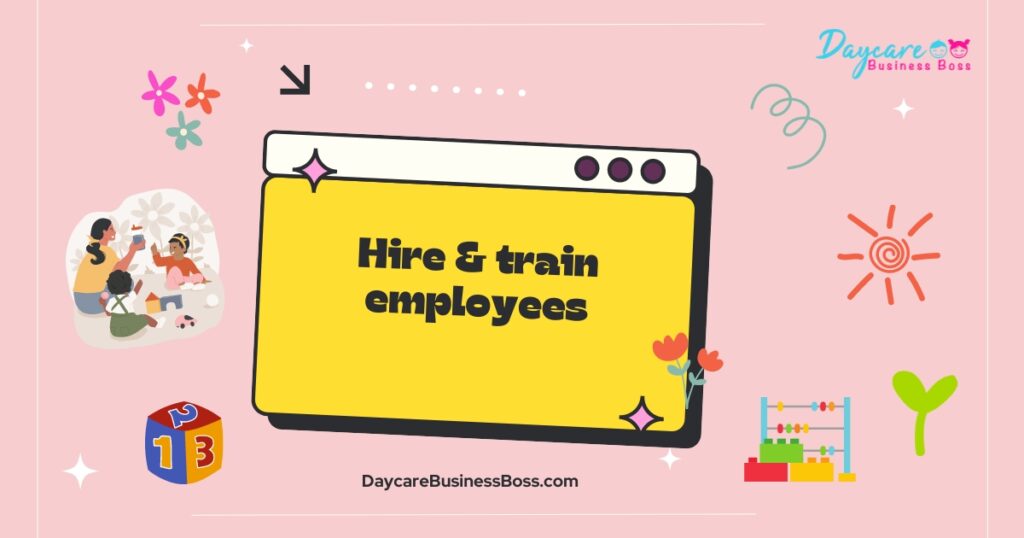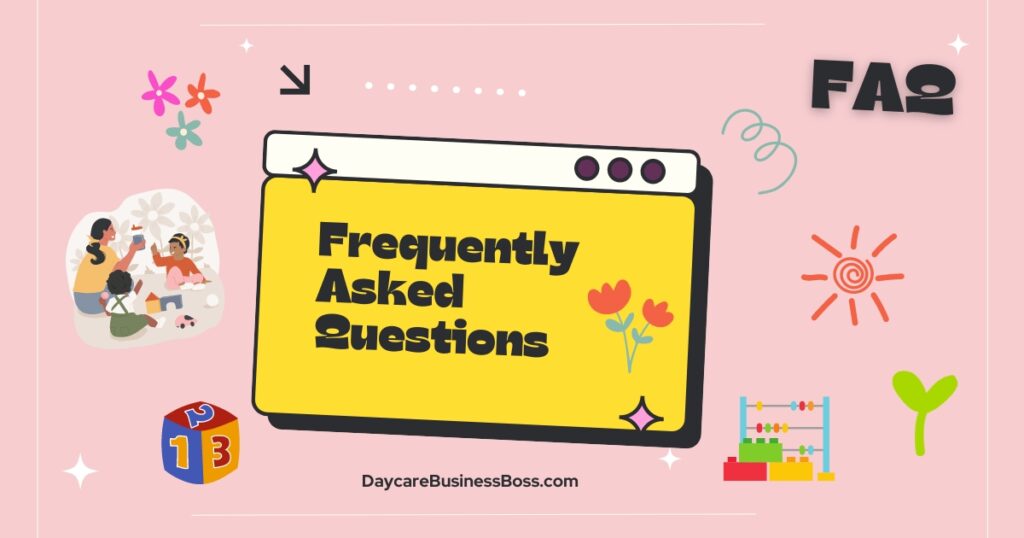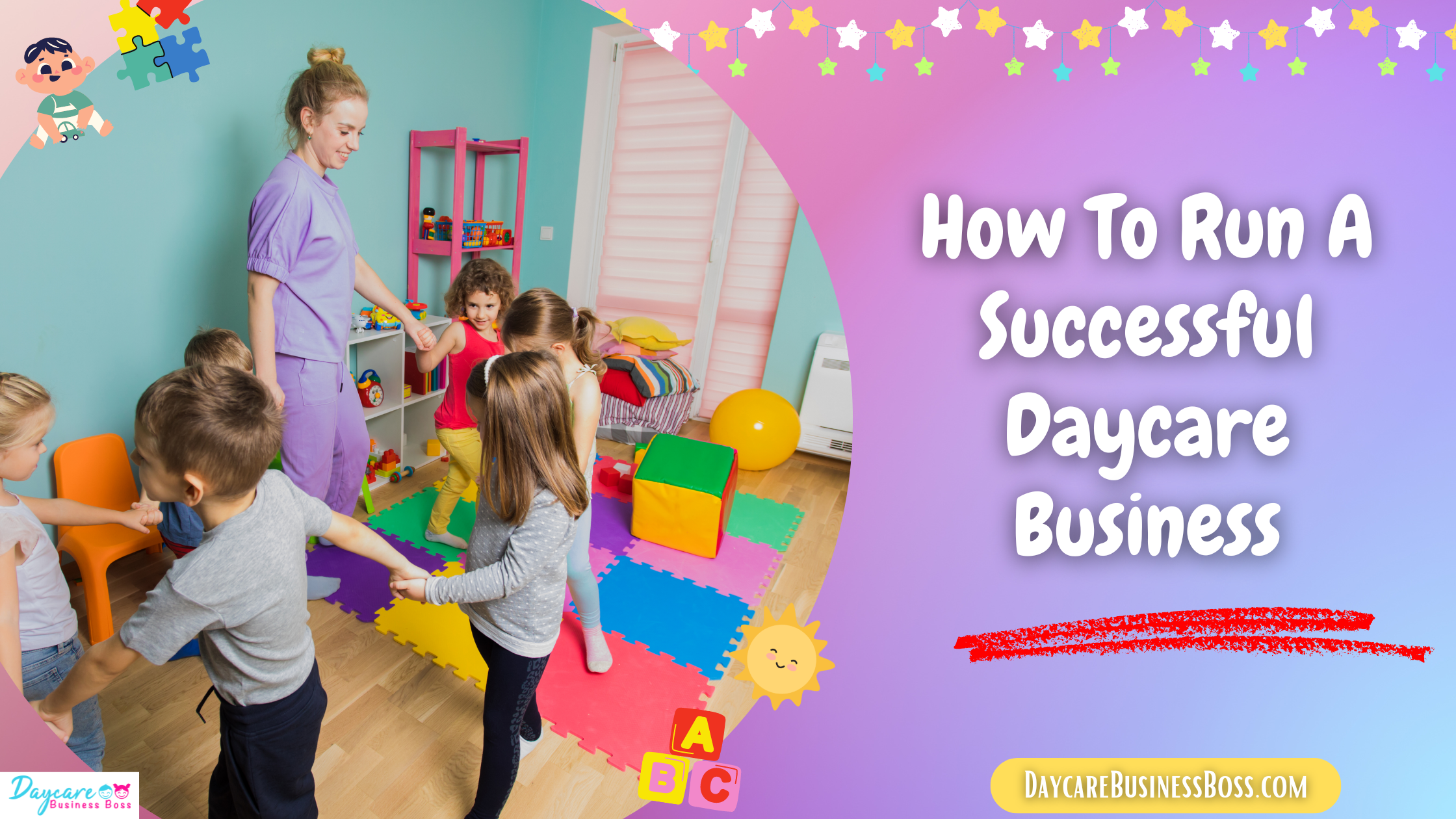Many people who open a daycare business do so because they love helping and caring for children. While this is certainly a wonderful reason to start a daycare, there are a number of other factors that ensure your daycare business will be a successful one.
To run a successful daycare business you need to:
- Write a bulletproof business plan
- Hire & train the right employees
- Develop a strong marketing plan
- Provide exceptional service
- Communicate and collaborate with employees
- Set goals
- Be passionate about your daycare facility
1. Write a bulletproof business plan
Your business plan is your road map that will help guide you through the ups & downs of owning a daycare. Starting your daycare business with a solid business plan will lay the foundation for a successful daycare facility.
A business plan to answer questions such as:
- Is this a viable business?
- What’s the market landscape?
- What will my expenses be?
- What’s my budget?
- When will I begin to turn a profit?
- How will I find customers?
- What type of daycare business will this be (Home-based, privately-owned, franchised)
There’s a number of other questions to address but these are a good starting point. Your business plan highlights some of the challenges you will face so you can prepare a plan for how to solve them.
Your business plan is meant to be a dynamic document that evolves as your business grows. Make sure you are updating your business plan regularly so it aligns with your goals and current status.
If you’re going to be applying for funding you will need to make a more extensive business plan, the standard format includes the following:
- Executive Summary
- A short paragraph summarizing the scope of your daycare business and your mission
- Company Description
- Outlines the basics of your daycare (type, size, etc.)
- Market Analysis
- What the competitive landscape looks like and where your daycare fits into it
- Organization & Management
- Owner, key partners, staff
- Service or Product Line
- What specific services do you offer (special needs, overnight care, bi-lingual education, etc.)
- Marketing & Sales
- How you are going to get the word out about your daycare and bring in customers
- Funding Request
- If you are asking for a loan, how much you are asking for, what type of loan, and how long until it’s paid off
- Financial Projections
- Estimates for start-up costs, operational costs, sales, and income
- Appendix
- Any additional documents relevant to your daycare
2. Hire & train employees

Your employees are the lifeblood of your daycare facility. They are going to be interacting with children and parents daily. If you hire inexperienced or incapable employees you are going to hurt your business and put children at risk.
If you follow the steps below you will be able to identify quality prospects, qualify these prospects, and then select the ones that fit best with your company.
Hiring employees
Job posting
The search for your ideal employee begins with a well-designed job posting. This is an important step that often gets overlooked and done incorrectly.
Some daycares try to oversell themselves and promise their potential employees a utopian life if they get hired. This is an issue because while this might attract a lot of prospects, it will inevitably lead to disappointment and frustration later on when reality starts to set in.
Another common mistake is to not be specific and upfront about what the job responsibilities are. If your employees are going to be performing unpleasant and difficult duties, such as changing diapers or cleaning up after accidents, let them know before they even click the apply button. When you do this, the people that do apply will be prepared and ready to perform these difficult tasks.
It is best to just be as honest as possible while you are writing your job posting. This will attract the right prospects and let them know what they are getting themselves into. Some things to include in your job posting:
- Brief business description
- Overall job scope
- Duties performed
- Job location
- Working environment
- Hours
- Flexibility of working hours
- Pay rate
- Experience required or preferred
- Preferred character traits
- Perks and benefits
- Training
Interviews
During the interview process the goal is to find out if the candidate is qualified for the position, but also to see if their personality fits in with you and the rest of your staff.
Before you dive into the interview, we recommend you prepare 12-15 questions for the candidate. It can also be helpful to do a mock interview with a friend so you can get a feel for the interview process.
Training employees
Training is something that often gets overlooked because owners feel that if an employee knows the basics of child care or has worked in the industry before, they know everything they need. Training employees properly is beneficial because it makes sure you and your employee are on the same page, they understand their expectations and responsibilities, and it builds confidence in them.
Performing a more thorough training costs more of your time upfront, but will help retain employees and keep customers and their children happy which will save you a lot more down the road.
Some areas where your employees need to be trained:

- Basic child care
- Safety and first aid
- Educational teaching
- Documentation/record keeping
- Customer service/interaction
Aside from having a well-trained employee, spending time with them helps you get to know them better. This is beneficial for identifying problem areas that need to be monitored, but also helps you and your new employee bond which will hopefully create loyalty and a long-term relationship.
When training a new employee, we strongly recommend starting them out paired with you, or an experienced employee. This helps them learn hands-on and have a mentor.
Working as a pair also helps you make sure they are meeting expectations and caring for the children adequately. If a new employee doesn’t do something because they didn’t know it was their responsibility, this could be a safety hazard and put your reputation at risk.
3. Develop a strong marketing plan
Some daycare owners overlook the importance of marketing because they feel that if they have a quality daycare center, people will come. This may be true in some cases, but every daycare center can benefit from a strong marketing plan.
There’s a couple of reasons for this. When you have a marketing plan in place, you will be targeting the right customers and quality customers who need your services. This leads to stronger relationships, less conflict, and less work trying to obtain these customers.
Also, at the end of the day, a quality marketing plan is going to make your business more money. Even if you’re in the daycare business to care for children and making money is an afterthought, you, the children, and your facility will benefit from extra cash flow. You will be able to buy nicer equipment, healthier food, and provide more services for the children.
4. Provide exceptional service
You can spend endless amounts of money on advertising, create a beautiful website, be ranked #1 on Google’s search engine, and you will probably have plenty of customers. But if you want to be a truly quality daycare center you need to offer unmatched service and care for the children.
The great thing is, providing excellent customer service typically doesn’t cost anything extra. If you have the right employees hired and trained, and they have bought into your mission, excellent customer service is just a byproduct of that.
With every customer interaction make sure you are genuine and treat them with respect and kindness. If you do this you will lay a solid foundation for you to build a quality daycare facility.
5. Communicate & collaborate with employees
As mentioned earlier, your employees are what make your daycare business thrive. Hopefully, you have put in the work to hire and train the right employees so you have a quality staff at your facility.
The process doesn’t stop there, you need to be communicating with your employees both to check-in to see if there are any issues that need to be addressed, but also to get their ideas about how to improve the facility.
You should be touching base with your employees at the beginning and end of each week. These don’t need to be long, drawn-out meetings (in fact they shouldn’t be), but they should be an area where you both can discuss specific issues with the daycare and how to better serve your customers and their children.
This is also a time that you can discuss an issue with an employee before it becomes a full-blown problem. This should be an open and honest discussion, typically the employee doesn’t understand the expectations for them and is just doing the best they can. Opening up this line of communication can save your daycare a lot of time dealing with employee-related issues.
6. Set goals
Similar to your business plan, setting goals can be a beacon of light to guide you through your business process. Setting goals helps you challenge yourself and your business, while also being a way to see how things are progressing in the big picture.
You don’t have to get too complicated with these, set 1-3 weekly, monthly, and yearly goals. Have them in a place that your employees will see on a daily basis and discuss them in your weekly meetings.
Make sure you create realistic, but challenging goals. If you make them unachievable, your employees will stop caring and there will be a drop in morale. If you make them too easy you’re not challenging yourself and your business could stagnate.
7. Be passionate about your daycare facility
There’s a lot of business practices that will improve your chances of running a successful daycare facility, but one of the best things you can do is to be passionate about your mission.
When you are passionate, this rubs on your employees, the children in your care, and their parents. When people see a passionate person running a business that they love, they want to support that person and their cause.
Please note: This blog post is for educational purposes only and does not constitute legal advice. Please consult a legal expert to address your specific needs.
Get ready to run your successful Daycare with our startup course and documents.

Meet Shawn Chun: Entrepreneur and Childcare Business Fan.
I’m a happy individual who happens to be an entrepreneur. I have owned several types of businesses in my life from a coffee shop to an import and export business to an online review business plus a few more and now I create online daycare business resources for those interested in starting new ventures. It’s demanding work but I love it. I do it for those passionate about their business and their goals. That’s why when I meet a childcare business owner, I see myself. I know how hard the struggle is to retain clients, find good employees and keep the business growing all while trying to stay competitive.
That’s why I created Daycare Business Boss: I want to help childcare business owners like you build a thriving business that brings you endless joy and supports your ideal lifestyle.


4 thoughts on “How To Run A Successful Daycare Business”
Comments are closed.